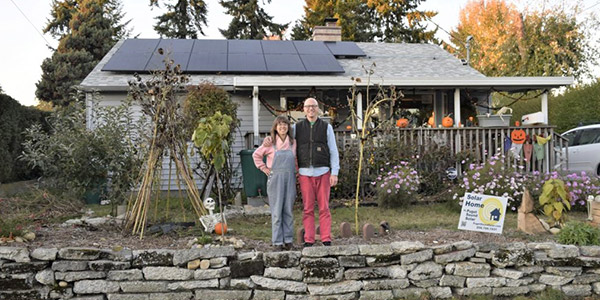Spark Northwest, a clean energy nonprofit, is working with community land trusts in Washington and Oregon to make solar affordable for low- and moderate-income households.
Unlike a community solar project, which requires a large upfront cost before electricity bill savings can be realized, Spark Northwest covers the entire cost of a small solar array on houses in the land trust while residents benefit from energy savings.
Installing rooftop solar is not an option for people who cannot afford the upfront price. Older houses also might require costly upgrades to their rooftops before they can support new solar projects, another financial burden that dissuades low-income homeowners from installing residential arrays.
“We realized we don’t want to be in the position of encouraging people to take out a loan, even a low interest loan, if they might risk default and thereby damage their credit,” Linda Irvine, program director of clean energy at Spark Northwest, said during a webinar hosted by Emerald Cities Collaborative.
In Oregon, Spark Northwest is taking advantage of the state’s Individual Development Account Initiative, which matches savings three to one for low- or moderate-income homeowners. As the nonprofit works with the land trust to install solar on members’ roofs, it also works to get members enrolled in the state program. Homeowners who need reroofing before they can install solar can save about $12,000 over three years to pay for the retrofit.
“Over the past nine years, we have run dozens of traditional solar campaigns, such as group purchase campaigns for residential solar,” Irvine said. “But a few years ago, we realized that we wanted to design a program or a campaign that would make solar truly affordable and accessible to moderate- or low-income homeowners.”
Under-resourced communities and communities of color disproportionately bear the burden of environmental injustice and climate change, but there are technical and financial challenges to supplying renewable energy to places on the frontlines of pollution impacts.
To address those challenges, Spark Northwest partnered with Homestead Community Land Trust in Seattle, which preserves the affordability of 215 single-family homes across the city.
In a community land trust, a nonprofit owns the land houses are built on to maintain their affordability for people who could not otherwise own a house. The homebuyer owns the building and leases the land at a low cost so they can build equity in their home.
If the homeowner chooses to sell the house, they are required by the community land trust to sell it to another low- or moderate-income buyer.
Irvine said the partnership with Homestead started small, with solar arrays on 11 homes at a low cost or no cost to the homeowners. Spark Northwest also offers participation in the group solar purchasing program to other homeowners in the land trust.
“We also set up low monthly payment financing for any remaining cost,” Irvine said.
Multilingual Outreach
Spark Northwest also partnered with local nonprofit Environmental Coalition of South Seattle to provide multicultural and multilingual outreach and education on solar initiatives.
“The ripple effects are significant,” Irvine said.
A Vietnamese-speaking homeowner in the land trust took advantage of a referral bonus program from the solar developer and translated the materials to share with friends. The installer for the land trust project, Puget Sound Solar, is now getting referrals and jobs from the Vietnamese-speaking community because of the homeowner’s efforts, Irvine said.



